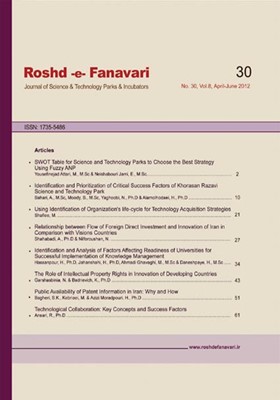The Role of Intellectual Properties Rights in Innovation of Developing Countries
Subject Areas :Neda Garshasbi niya 1 , Kamareddin Badry Vig 2
1 -
2 -
Keywords: IPR, Innovation, Economic Growth, Developing Countries,
Abstract :
Much debate in the field of intellectual property rights and its role in economic development is going on. This paper out of four economic variables that affected by IPR, FDI, trade, innovation, public health, genetic resources and traditional knowledge discuss about the effects of stronger IPRs in developing countries on innovation. Here innovation is defined base on OECD statements. Innovation is the implementation of a new or significantly improved product (good or service), process, new marketing method or a new organisational method in business practices, workplace organisation or external relations. Where the cost of research is high and there is much risk for the return of the investment, countries use different strategies to encourage the innovation. Implementing a strong IPR regime is an important way to motivate researchers and firms for R&D activities. An empirical study has been conducted on 118 countries, both developing and developed countries. It is concluded that stronger IPR does not have direct effect on economic growth or increasing innovation in developing countries while a direct and strong relationship between these variables are visible in developed countries. The positive role of IPR in the economic of developing countries must be accounted, in addition these countries are under the pressure of developed countries to strength their IPR regime, so the countries must develop their IPR law in a manner to prepare most effective way for improving their economic.


